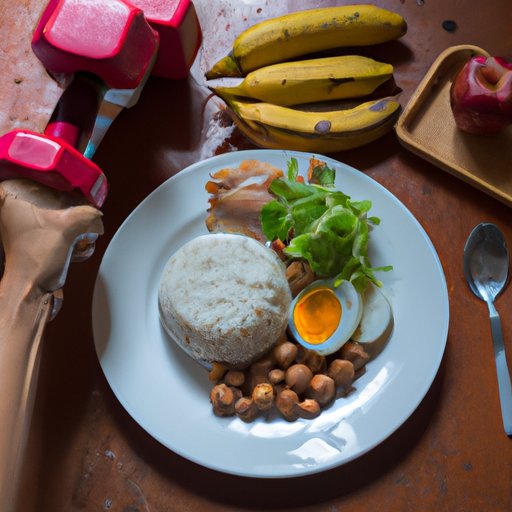Introduction
Whether you’re a professional athlete or just starting out with a new exercise regimen, what you eat before and after your workouts can have a major impact on how you perform and recover. But with so many different opinions on when and what to eat, it can be hard to know where to start. This article will explore the debate of eating before or after a workout, weighing the pros and cons of both pre- and post-workout nutrition.
The Benefits of Pre-Workout Nutrition
For athletes, pre-workout nutrition is essential for getting the most out of their performance. Eating the right foods at the right time helps maximize energy levels and delay fatigue during exercise. According to Dr. Roberta Anding, Director of Sports Nutrition at Baylor College of Medicine, “Eating protein and carbohydrates before exercise helps fuel the body and optimizes performance.”
What to Eat Before Exercise
When it comes to pre-workout nutrition, there are several key nutrients that athletes should focus on. Carbohydrates are important for providing energy, while proteins help build and repair muscles. Some good pre-workout snacks include a banana with peanut butter, oatmeal with berries, or whole wheat toast with eggs. It’s also important to stay hydrated throughout your workout, so make sure to drink plenty of water before and during exercise.
How Timing Your Meals Can Help You Reach Fitness Goals
Timing your meals before and after your workout is also important for optimizing performance. Eating too close to your workout can lead to stomach discomfort and cramping, while eating too far away can mean a lack of energy during exercise. In general, it’s best to eat a meal or snack about 2-3 hours before exercising, and if you need a quick pick-me-up, opt for something light like a piece of fruit or yogurt about 30 minutes before your workout.
The Benefits of Eating After Your Workout
Post-workout nutrition is just as important as pre-workout nutrition, as it helps replenish your body after exercise. Eating the right foods after a workout helps your body recover and rebuild muscle tissue, while providing the energy needed to keep up with your daily activities. According to registered dietitian Jennifer McDaniel, “Eating a combination of carbohydrates and protein within two hours of your workout can help maximize muscle recovery and growth.”
What to Eat After Exercise
When it comes to post-workout nutrition, there are a few key nutrients to focus on. Aim for a balance of carbohydrates and proteins, such as a smoothie with Greek yogurt and fruit, a turkey sandwich, or a bowl of oatmeal with nuts and seeds. It’s also important to rehydrate after exercise, so make sure to drink plenty of water throughout the day.
Understanding the Impact of Eating After Exercise on Performance and Recovery
In addition to providing your body with the nutrients it needs to recover, eating after exercise can also help improve your performance in the future. According to a study published in the Journal of the International Society of Sports Nutrition, “consuming a high-carbohydrate, high-protein meal or snack immediately after exercise can help to improve subsequent exercise performance.”
Conclusion
Eating before and after exercise is an important part of any fitness routine. Pre-workout nutrition provides energy and helps delay fatigue during exercise, while post-workout nutrition helps replenish the body and promote muscle recovery. When choosing what to eat, aim for a balance of carbohydrates and proteins, and try to time your meals about 2-3 hours before and after your workout. By following these tips, you can optimize your performance and reach your fitness goals.
(Note: Is this article not meeting your expectations? Do you have knowledge or insights to share? Unlock new opportunities and expand your reach by joining our authors team. Click Registration to join us and share your expertise with our readers.)
